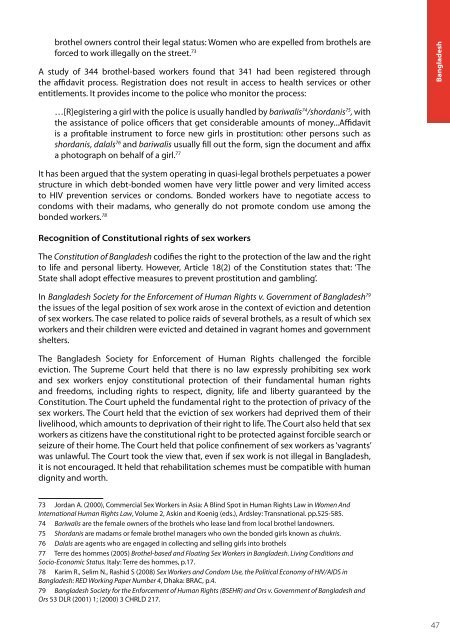SEX WORK AND THE LAW - HIV/AIDS Data Hub
SEX WORK AND THE LAW - HIV/AIDS Data Hub
SEX WORK AND THE LAW - HIV/AIDS Data Hub
You also want an ePaper? Increase the reach of your titles
YUMPU automatically turns print PDFs into web optimized ePapers that Google loves.
othel owners control their legal status: Women who are expelled from brothels are<br />
forced to work illegally on the street. 73<br />
A study of 344 brothel-based workers found that 341 had been registered through<br />
the affidavit process. Registration does not result in access to health services or other<br />
entitlements. It provides income to the police who monitor the process:<br />
Bangladesh<br />
…[R]egistering a girl with the police is usually handled by bariwalis 74 /shordanis 75 , with<br />
the assistance of police officers that get considerable amounts of money...Affidavit<br />
is a profitable instrument to force new girls in prostitution: other persons such as<br />
shordanis, dalals 76 and bariwalis usually fill out the form, sign the document and affix<br />
a photograph on behalf of a girl. 77<br />
It has been argued that the system operating in quasi-legal brothels perpetuates a power<br />
structure in which debt-bonded women have very little power and very limited access<br />
to <strong>HIV</strong> prevention services or condoms. Bonded workers have to negotiate access to<br />
condoms with their madams, who generally do not promote condom use among the<br />
bonded workers. 78<br />
Recognition of Constitutional rights of sex workers<br />
The Constitution of Bangladesh codifies the right to the protection of the law and the right<br />
to life and personal liberty. However, Article 18(2) of the Constitution states that: ‘The<br />
State shall adopt effective measures to prevent prostitution and gambling’.<br />
In Bangladesh Society for the Enforcement of Human Rights v. Government of Bangladesh 79<br />
the issues of the legal position of sex work arose in the context of eviction and detention<br />
of sex workers. The case related to police raids of several brothels, as a result of which sex<br />
workers and their children were evicted and detained in vagrant homes and government<br />
shelters.<br />
The Bangladesh Society for Enforcement of Human Rights challenged the forcible<br />
eviction. The Supreme Court held that there is no law expressly prohibiting sex work<br />
and sex workers enjoy constitutional protection of their fundamental human rights<br />
and freedoms, including rights to respect, dignity, life and liberty guaranteed by the<br />
Constitution. The Court upheld the fundamental right to the protection of privacy of the<br />
sex workers. The Court held that the eviction of sex workers had deprived them of their<br />
livelihood, which amounts to deprivation of their right to life. The Court also held that sex<br />
workers as citizens have the constitutional right to be protected against forcible search or<br />
seizure of their home. The Court held that police confinement of sex workers as ‘vagrants’<br />
was unlawful. The Court took the view that, even if sex work is not illegal in Bangladesh,<br />
it is not encouraged. It held that rehabilitation schemes must be compatible with human<br />
dignity and worth.<br />
73 Jordan A. (2000), Commercial Sex Workers in Asia: A Blind Spot in Human Rights Law in Women And<br />
International Human Rights Law, Volume 2, Askin and Koenig (eds.), Ardsley: Transnational. pp.525-585.<br />
74 Bariwalis are the female owners of the brothels who lease land from local brothel landowners.<br />
75 Shordanis are madams or female brothel managers who own the bonded girls known as chukris.<br />
76 Dalals are agents who are engaged in collecting and selling girls into brothels<br />
77 Terre des hommes (2005) Brothel-based and Floating Sex Workers in Bangladesh. Living Conditions and<br />
Socio-Economic Status. Italy: Terre des hommes, p.17.<br />
78 Karim R., Selim N., Rashid S (2008) Sex Workers and Condom Use, the Political Economy of <strong>HIV</strong>/<strong>AIDS</strong> in<br />
Bangladesh: RED Working Paper Number 4, Dhaka: BRAC, p.4.<br />
79 Bangladesh Society for the Enforcement of Human Rights (BSEHR) and Ors v. Government of Bangladesh and<br />
Ors 53 DLR (2001) 1; (2000) 3 CHRLD 217.<br />
47
















